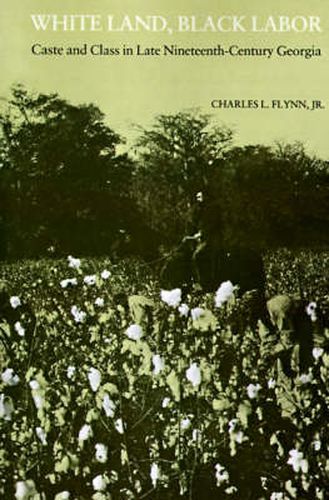Readings Newsletter
Become a Readings Member to make your shopping experience even easier.
Sign in or sign up for free!
You’re not far away from qualifying for FREE standard shipping within Australia
You’ve qualified for FREE standard shipping within Australia
The cart is loading…






This title is printed to order. This book may have been self-published. If so, we cannot guarantee the quality of the content. In the main most books will have gone through the editing process however some may not. We therefore suggest that you be aware of this before ordering this book. If in doubt check either the author or publisher’s details as we are unable to accept any returns unless they are faulty. Please contact us if you have any questions.
The society of the postbellum South was built upon two interweaving but ultimately irreconcilable systems: a racist caste system and an economic class system. The caste system was supposed to assure that all whites would be equals above the underclass of black laborers. But the class system that emerged in the years after the war placed lower-class whites in the same economic position as the emancipated slaves – a situation totally at odds with prevailing white ideology. In White Land, Black Labor, Charles Flynn examines the interplay of the caste and class systems of Reconstruction Georgia, revealing how the efforts of both the planters and poorer whites to retain blacks in a position of subservience assured that in this state – as in the South as a whole – there would be little significant economic progress until well into the next century. The caste faith of the white Georgians encouraged landowning employers to seek increased exploitation rather than economic growth; at the same time, it motivated landless whites to focus their energies on the greater subordination of black laborers rather than on achieving equality with wealthier whites. Despite the facade of southern caste faith, the constitutional amendments adopted during Reconstruction assured that blacks could not legally be treated as a separate laboring class. As a result, the measures employed by the planters to increase their control over the black laborers applied to a growing number of landless whites as well. With blacks more free and whites more oppressed than the prevailing social ideology deemed appropriate, the distinction between the system of class division among whites and the caste barrier that separated blacks and whites began to fracture – leading to political dissent in the nineteenth century and setting the stage for the demagogue politicians of the twentieth century.
$9.00 standard shipping within Australia
FREE standard shipping within Australia for orders over $100.00
Express & International shipping calculated at checkout
This title is printed to order. This book may have been self-published. If so, we cannot guarantee the quality of the content. In the main most books will have gone through the editing process however some may not. We therefore suggest that you be aware of this before ordering this book. If in doubt check either the author or publisher’s details as we are unable to accept any returns unless they are faulty. Please contact us if you have any questions.
The society of the postbellum South was built upon two interweaving but ultimately irreconcilable systems: a racist caste system and an economic class system. The caste system was supposed to assure that all whites would be equals above the underclass of black laborers. But the class system that emerged in the years after the war placed lower-class whites in the same economic position as the emancipated slaves – a situation totally at odds with prevailing white ideology. In White Land, Black Labor, Charles Flynn examines the interplay of the caste and class systems of Reconstruction Georgia, revealing how the efforts of both the planters and poorer whites to retain blacks in a position of subservience assured that in this state – as in the South as a whole – there would be little significant economic progress until well into the next century. The caste faith of the white Georgians encouraged landowning employers to seek increased exploitation rather than economic growth; at the same time, it motivated landless whites to focus their energies on the greater subordination of black laborers rather than on achieving equality with wealthier whites. Despite the facade of southern caste faith, the constitutional amendments adopted during Reconstruction assured that blacks could not legally be treated as a separate laboring class. As a result, the measures employed by the planters to increase their control over the black laborers applied to a growing number of landless whites as well. With blacks more free and whites more oppressed than the prevailing social ideology deemed appropriate, the distinction between the system of class division among whites and the caste barrier that separated blacks and whites began to fracture – leading to political dissent in the nineteenth century and setting the stage for the demagogue politicians of the twentieth century.